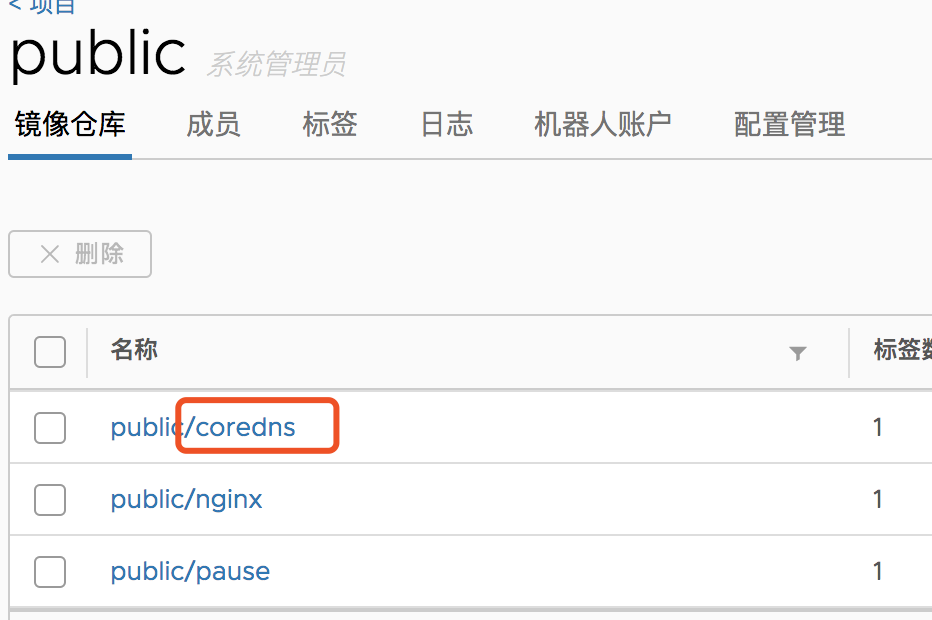The default service discovery in k8s is to automatically associate the service name to the clusterIP through dns
Deploy the resource configuration list HTTP service in k8s:
On the hdss7-200 host, configure a nginx virtual host to provide a unified resource configuration list access portal for the k8s intranet:
[root@hdss7-200 conf.d]# cat k8s-yaml.od.com.conf
server {
listen 80;
server_name k8s-yaml.od.com;
location / {
autoindex on;
default_type text/plain;
root /data/k8s-yaml;
}
}
nginx -s reload
mkdir -p /data/k8s-yaml/corednsConfigure domain name resolution in Intranet dns:
named]# vi od.com.zone k8s-yaml A 10.4.7.200 named]# systemctl restart named
Resolution verification:
named]# dig @10.4.7.11 k8s-yaml.od.com +short 10.4.7.200
Install and deploy CoreDNS to deliver software to k8s as a container:
Pull the official image from docker Harbor:
docker pull coredns/coredns:1.6.1 k8s-yaml]# docker tag c0f6e815079e harbor.od.com/public/coredns:v1.6.1 [root@hdss7-200 k8s-yaml]# docker push harbor.od.com/public/coredns:v1.6.1

Prepare resource allocation list:
# pwd
/data/k8s-yaml/coredns
# cat rbac.yaml
apiVersion: v1
kind: ServiceAccount
metadata:
name: coredns
namespace: kube-system
labels:
kubernetes.io/cluster-service: "true"
addonmanager.kubernetes.io/mode: Reconcile
---
apiVersion: rbac.authorization.k8s.io/v1
kind: ClusterRole
metadata:
labels:
kubernetes.io/bootstrapping: rbac-defaults
addonmanager.kubernetes.io/mode: Reconcile
name: system:coredns
rules:
- apiGroups:
- ""
resources:
- endpoints
- services
- pods
- namespaces
verbs:
- list
- watch
---
apiVersion: rbac.authorization.k8s.io/v1
kind: ClusterRoleBinding
metadata:
annotations:
rbac.authorization.kubernetes.io/autoupdate: "true"
labels:
kubernetes.io/bootstrapping: rbac-defaults
addonmanager.kubernetes.io/mode: EnsureExists
name: system:coredns
roleRef:
apiGroup: rbac.authorization.k8s.io
kind: ClusterRole
name: system:coredns
subjects:
- kind: ServiceAccount
name: coredns
namespace: kube-system
# cat dp.yaml
apiVersion: apps/v1
kind: Deployment
metadata:
name: coredns
namespace: kube-system
labels:
k8s-app: coredns
kubernetes.io/name: "CoreDNS"
spec:
replicas: 1
selector:
matchLabels:
k8s-app: coredns
template:
metadata:
labels:
k8s-app: coredns
spec:
priorityClassName: system-cluster-critical
serviceAccountName: coredns
containers:
- name: coredns
image: harbor.od.com/public/coredns:v1.6.1
args:
- -conf
- /etc/coredns/Corefile
volumeMounts:
- name: config-volume
mountPath: /etc/coredns
ports:
- containerPort: 53
name: dns
protocol: UDP
- containerPort: 53
name: dns-tcp
protocol: TCP
- containerPort: 9153
name: metrics
protocol: TCP
livenessProbe:
httpGet:
path: /health
port: 8080
scheme: HTTP
initialDelaySeconds: 60
timeoutSeconds: 5
successThreshold: 1
failureThreshold: 5
dnsPolicy: Default
volumes:
- name: config-volume
configMap:
name: coredns
items:
- key: Corefile
path: Corefile
# cat cm.yaml
apiVersion: v1
kind: ConfigMap
metadata:
name: coredns
namespace: kube-system
data:
Corefile: |
.:53 {
errors
log
health
ready
kubernetes cluster.local 192.168.0.0/16
forward . 10.4.7.11
cache 30
loop
reload
loadbalance
}
# cat svc.yaml
apiVersion: v1
kind: Service
metadata:
name: coredns
namespace: kube-system
labels:
k8s-app: coredns
kubernetes.io/cluster-service: "true"
kubernetes.io/name: "CoreDNS"
spec:
selector:
k8s-app: coredns
clusterIP: 192.168.0.2
ports:
- name: dns
port: 53
protocol: UDP
- name: dns-tcp
port: 53
- name: metrics
port: 9153
protocol: TCPUse the declarative resource management approach to apply our declarative resource allocation checklist:
[root@hdss7-21 ~]# kubectl apply -f http://k8s-yaml.od.com/coredns/rbac.yaml serviceaccount/coredns created clusterrole.rbac.authorization.k8s.io/system:coredns created clusterrolebinding.rbac.authorization.k8s.io/system:coredns created [root@hdss7-21 ~]# kubectl apply -f http://k8s-yaml.od.com/coredns/cm.yaml configmap/coredns created [root@hdss7-21 ~]# kubectl apply -f http://k8s-yaml.od.com/coredns/dp.yaml deployment.apps/coredns created [root@hdss7-21 ~]# kubectl apply -f http://k8s-yaml.od.com/coredns/svc.yaml service/coredns created [root@hdss7-21 ~]# kubectl get all -n kube-system NAME READY STATUS RESTARTS AGE pod/coredns-6b6c4f9648-j7cv9 1/1 Running 0 34s NAME TYPE CLUSTER-IP EXTERNAL-IP PORT(S) AGE service/coredns ClusterIP 192.168.0.2 <none> 53/UDP,53/TCP,9153/TCP 31s NAME READY UP-TO-DATE AVAILABLE AGE deployment.apps/coredns 1/1 1 1 34s NAME DESIRED CURRENT READY AGE replicaset.apps/coredns-6b6c4f9648 1 1 1 34s
Resolve to verify coreDNS is available:
~]# dig -t A www.baidu.com +short @192.168.0.2 www.a.shifen.com. 14.215.177.39 14.215.177.38 ~]# dig -t A harbor.od.com +short @192.168.0.2 10.4.7.200 [root@hdss7-21 ~]# kubectl get svc -n kube-public NAME TYPE CLUSTER-IP EXTERNAL-IP PORT(S) AGE nginx-dp ClusterIP 192.168.47.82 <none> 80/TCP 10h
We must use the global domain name to resolve the ip address of the service outside the cluster
[root@hdss7-21 ~]# dig -t A nginx-dp.kube-public.svc.cluster.local. @192.168.0.2 +short 192.168.47.82
However, if you are in the cluster, you can use the short domain name. You can see the resolved configuration file:
[root@hdss7-21 ~]# kubectl get pod -o wide NAME READY STATUS RESTARTS AGE IP NODE NOMINATED NODE READINESS GATES nginx-ds-rxfqd 1/1 Running 0 11h 172.7.22.2 hdss7-22.host.com <none> <none> nginx-ds-xm5l2 1/1 Running 0 11h 172.7.21.2 hdss7-21.host.com <none> <none> [root@hdss7-21 ~]# kubectl exec -it nginx-ds-xm5l2 -n default bash
The default k8s has helped us configure the serch, that is, we can use the short domain name to resolve the ip address
root@nginx-ds-xm5l2:/# cat /etc/resolv.conf nameserver 192.168.0.2 search default.svc.cluster.local svc.cluster.local cluster.local host.com options ndots:5